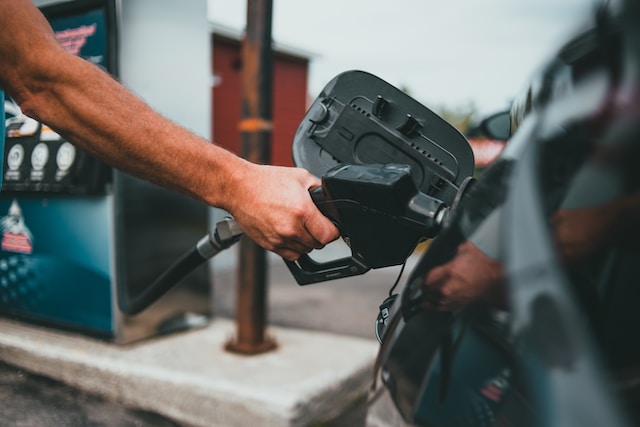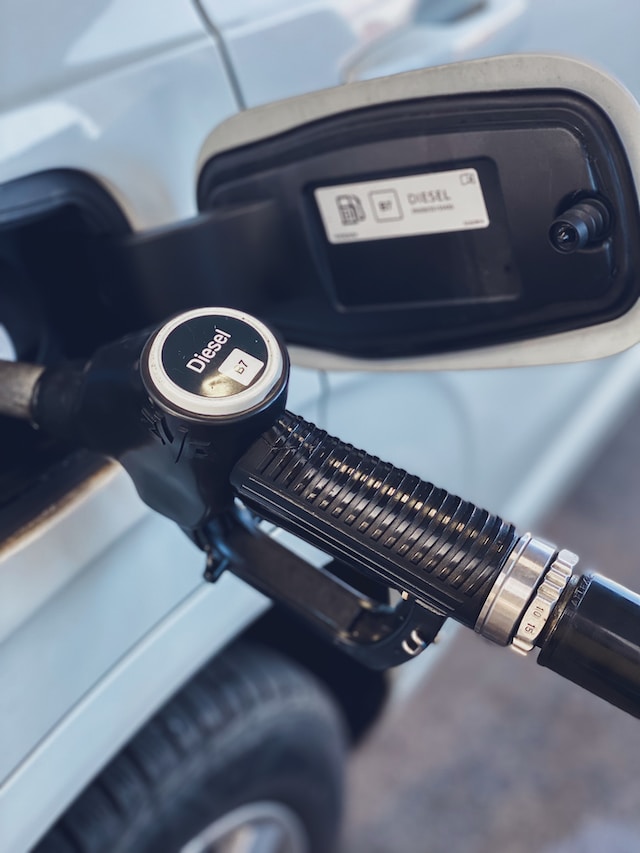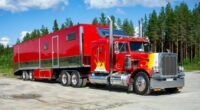Understanding the difference between petrol and diesel fuels helps you make an informed decision when choosing a new car or maintaining an existing one. With this knowledge in hand along with regular maintenance practices should help ensure that your vehicle remains reliable over time.
What is petrol?
(Photo by Erik Mclean on Unsplash )

Petrol, also known as gasoline, is a fossil fuel derived from crude oil. It’s a transparent liquid that is highly flammable and used in internal combustion engines to power cars, motorcycles, and other vehicles.
The chemical composition of petrol varies depending on where it was sourced from and how it was refined. Generally speaking, it consists mainly of hydrocarbons ranging from C4H10 to C12H26. Petrol has a lower density than diesel fuel which means that you’ll need more petrol to cover the same distance as diesel.
Petrol has been the most popular choice for private motorists because of its smooth performance and availability at almost all petrol stations across the world. However, with rising concerns over environmental pollution caused by carbon emissions from automobiles using petrol engines have led car manufacturers to shift towards electric motors or hybrid technology.
While still considered an essential component in powering many vehicles today; as we move forward into the future of sustainable energy sources – our reliance on petroleum-based fuels like gasoline will continue to be reevaluated for their ecological impact and sustainability going forward
What is diesel?
(Photo by Jennifer Latuperisa-Andresen on Unsplash )

Diesel is a type of fuel commonly used in diesel engines, which are often found in trucks and heavy-duty vehicles. It is made from crude oil through a process called fractional distillation. During this process, the heavier hydrocarbons in crude oil are separated from the lighter ones to create diesel.
One key difference between petrol and diesel is that diesel has a higher energy density than petrol. This means that it can produce more power per unit of fuel compared to petrol. Diesel also has a lower volatility than petrol, which makes it less likely to evaporate and escape into the atmosphere.
Another unique characteristic of diesel is its combustion process. Unlike gasoline engines, which use spark plugs to ignite the fuel-air mixture, diesel engines rely on compression-ignition. This means that as air is compressed inside the engine’s cylinders, it heats up enough to ignite the fuel without needing a spark.
While both fuels have their advantages and disadvantages depending on how they are used and what kind of vehicle they power, understanding how these differences impact performance can help drivers make informed decisions about what type of car or truck may be best for them.
Petrol Vs. Diesel – Key differences
When it comes to comparing petrol and diesel, the key differences lie in their composition, energy content, and combustion process.
Petrol contains a mixture of hydrocarbons with fewer carbon atoms per molecule than diesel fuel. This makes petrol less efficient but also cleaner burning than diesel. Diesel fuel has more carbon atoms per molecule which gives it a higher energy density resulting in better efficiency for larger engines.
Another significant difference between petrol and diesel is how they combust within an engine. Petrol is highly volatile and ignites easily with a spark plug while diesel requires compression ignition due to its low volatility.
The cost of production also sets them apart as producing diesel is generally more expensive due to its complex refining process compared to that of petrol.
Emissions from both fuels differ greatly too – diesels tend to emit more nitrogen oxides (NOx) while gasoline cars produce more toxic organic compounds like benzene or formaldehyde.
Understanding these differences can help you make informed decisions when choosing between vehicles powered by either fuel type depending on your needs.
Advantages and disadvantages of petrol vehicles
Petrol vehicles, also known as gasoline vehicles, have been the primary mode of transportation for decades. They come with their own set of advantages and disadvantages that must be considered before making a purchase decision.
One of the most significant advantages of petrol cars is their affordability. Compared to their diesel counterparts, petrol vehicles tend to be cheaper upfront. Additionally, they are often more fuel-efficient on shorter trips around town due to their lighter weight and smaller engines.
However, petrol cars have some downsides too. Firstly, they emit higher levels of carbon dioxide than diesel cars – which isn’t good news for the environment. Secondly, their engines tend to wear out faster because they operate at higher RPMs compared to diesel engines.
Another disadvantage is fuel economy; while petrol-powered engines may perform better in short distances or city driving conditions when it comes to longer distances or highways driving conditions they can become less cost-effective because these engine types typically consume more fuel compared with its diesel counterpart.
In summary, there are pros and cons associated with owning a petrol vehicle just like any other type of vehicle. It’s important to keep your specific needs in mind when deciding if a petrol car is right for you but one thing is certain: this type of engine has been popular among drivers worldwide for many years now thanks mainly due its lower initial costs and excellent performance capabilities in urban environments!
Advantages and disadvantages of diesel vehicles
Diesel vehicles have several advantages that make them a popular choice for many drivers. One of the main advantages is fuel efficiency, as diesel engines are known to be more efficient than petrol engines. This means that they get better mileage and can save you money on fuel costs in the long run.
Another advantage of diesel vehicles is their torque power, which makes them ideal for towing or hauling heavy loads. Additionally, diesel engines tend to last longer than petrol engines due to their sturdier construction and lower operating temperatures.
However, there are also some downsides to owning a diesel vehicle. One major disadvantage is the higher initial cost compared to petrol cars. Additionally, diesel fuel can be more expensive than regular unleaded gasoline in some areas.
Diesel vehicles also emit more particulate matter and nitrogen oxides (NOx) into the air compared to petrol cars, which can contribute to air pollution and negatively impact human health.
Deciding whether a diesel vehicle is right for you depends on your individual needs and priorities as a driver. While they may offer certain benefits over petrol cars, it’s important also to consider the potential drawbacks before making your decision.
Which fuel type car is best?
When it comes to deciding between petrol and diesel vehicles, the best option for you will depend on your individual needs. Here are a few factors to consider when choosing which fuel type car is best for you.
Firstly, if you’re looking for a vehicle with quick acceleration and smooth handling, a petrol car may be the better choice. Petrol engines tend to be more responsive at low speeds and provide a smoother ride overall.
On the other hand, if fuel efficiency is your top priority, then diesel could be the way to go. Diesel cars generally have better mileage than their petrol counterparts due to higher compression ratios in their engines.
Another factor to consider is maintenance costs. Diesel engines can often require more expensive repairs than petrol engines, so keep this in mind when making your decision.
It’s worth considering environmental impact. While both types of fuels produce emissions that contribute to pollution and climate change, some studies suggest that diesel produces more harmful pollutants than petrol.
There isn’t necessarily one clear winner when it comes to deciding between petrol or diesel vehicles – it all depends on what’s most important for your specific situation.
Do diesel engines last longer?
One of the most commonly debated topics when it comes to petrol vs diesel engines is their longevity. Diesel enthusiasts often argue that their engines have a longer lifespan than their petrol counterparts, but is there any truth to this claim?
To answer this question, we need to look at the key differences between diesel and petrol engines. One major difference is the way in which these two types of fuel combust inside an engine. Diesel fuel ignites under compression, while petrol requires a spark from a spark plug.
This means that diesel engines are built with sturdier components compared to petrol engines. They can withstand higher levels of stress and pressure without sustaining damage or breaking down. Additionally, diesel fuel burns more efficiently than petrol resulting in less wear and tear on engine parts over time.
However, just because diesel engines are built tough doesn’t necessarily mean they last longer than their petrol counterparts. Proper maintenance plays a crucial role in determining how many miles a car can travel before experiencing significant mechanical problems.
While it’s true that well-maintained diesel vehicles can last for hundreds of thousands of miles if driven carefully and serviced regularly; equally well-maintained gasoline cars can also achieve similar mileage figures as long as they receive regular preventive care such as oil changes and tune-ups regardless of whether you choose gasoline or diesel engine will largely depend on your personal preferences as well as factors such as budget, driving habits and other needs specific to your lifestyle
Featured Image By – Jakob Rosen on Unsplash








